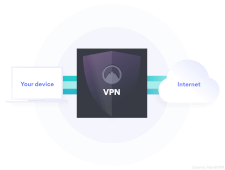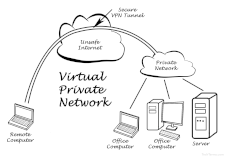VPN
Stands for "Virtual Private Network." A VPN is a service that provides secure, anonymous Internet access. It "tunnels" your Internet connection from your ISP through one or more VPN servers, which hides your actual IP address and location.
Besides obfuscating your IP address, most VPNs encrypt your connection to provide extra security. The encryption encodes all data you send and receive, ensuring no one can eavesdrop on your Internet activity.
Most VPNs work with both desktop and mobile devices. Some VPN services are free to use, but the highest-quality ones charge a monthly fee. Generally, paid VPNs are faster and more reliable than free ones. Examples of VPN providers include:
- NordVPN
- ExpressVPN
- CyberGhost
- Surfshark
- ProtonVPN
NOTE: Businesses may also create private VPNs that employees must use to remotely access sensitive data. Company-specific VPNs typically require authentication, encrypt all connections, and limit the Internet locations users can access.
 Test Your Knowledge
Test Your Knowledge
